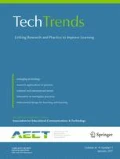Abstract
The field of educational technology has seen marked growth from just a small number of distance-based doctoral programs to nearly 20 today. Creating and sustaining a quality doctoral program of any kind requires a substantial amount of work; the additional challenges of online programs both increases and changes the nature of the efforts required. Among these challenges is creating an admissions process that treats people fairly, does not create a burdensome system for applicants or those involved in the selection process, and ensures the selection of a solid foundation of high quality candidates with whom faculty can mentor, who add value to the program, and who can benefit from the program. This paper explores common admissions requirements among institutions offering a distance or hybrid doctorate in educational technology and examines the specific admissions system used by the Department of Educational Technology at Boise State University.
Similar content being viewed by others
References
Burnett, P. C. (1999). The supervision of doctoral dissertations using a collaborative cohort model. Counselor Education and Supervision, 39(1), 46-52.
Burton, N. W., & Wang, M. M. (2005). Predicting longterm success in graduate school: A collaborative validity study. [Research report]. Princeton, NJ: Educational Testing Service.
Colarelli, S. M., Monnot, M. J., Ronan, G. F., & Roscoe, A. M. (2012). Administrative assumptions in topdown selection: A test in graduate school admission decisions. Applied Psychology, 61(3), 498-512.
Dawson, K., Cavanaugh, C., Sessums, C., Black, E. & Kumar, S. (2011). Designing a professional practice doctoral degree in Educational Technology: Signature pedagogies, implications and recommendations. Journal of Distance Education, 25(3). Retrieved from http://www.jofde.ca/index.php/jde/article/view/767
Drew, C. (2011, November 4). Why science majors change their minds (It’s just so darn hard). New York Times. Retrieved from http://www.nytimes.com/2011/11/06/education/edlife/why-science-majors-change-their-mind-its-just-sodarn-hard.html?pagewanted=all&_r=0
Eiszler, C. F. (2002). College students’ evaluations of teaching and grade inflation. Research in Higher Education, 43(4), 483-501.
Estimating the effect a ban on racial preferences would have on African- American admissions to the nation’s leading graduate schools. (1998). The Journal of Blacks in Higher Education, 19, 80-82.
Fu, Y. (2012). The effectiveness of traditional admissions criteria in predicting college and graduate success for American and international students (Doctoral dissertation, The University of Arizona). Retrieved from http://arizona.openrepository.com/arizona/bitstream/10150/217056/1/azu_etd_11970_sip1_m.pdf
Golde, C. M. (2006). Preparing stewards of the discipline. In C. M. Golde & G. E. Walker (Eds.), Envisioning the future of doctoral education: Preparing stewards of the discipline (pp. 3-20). Stanford, CA: The Carnegie Foundation for the Advancement of Teaching.
Golde, C. M., & Walker, G. E. (Eds.). (2006). Envisioning the future of doctoral education: Preparing stewards of the discipline. Stanford, CA: The Carnegie Foundation for the Advancement of Teaching.
Hawley, P. (2003). Being bright is not enough: The unwritten rules of doctoral study. Springfield, IL: Charles C. Thomas.
Jaschik, S. (2007). ETS aborts new GRE. Inside Higher Ed. Retrieved from http://www.insidehighered.com/news/2007/04/03/ets
Kohn, A. (2002). The dangerous myth of grade inflation. Chronicle of Higher Education, 49(11), B7.
Kumar, S., & Johnson, M. (2014). Research and dissertations: Challenges overcome by online doctoral students. In P. R. Lowenthal, C. S. York, & J. C. Richardson (Eds.), Online learning: Common misconceptions, benefits, and challenges. Hauppauge, NY: Nova Science Publishers.
Kuncel, N. R., Wee, S., Serafin, L., & Hezlett, S. A. (2010). The validity of the Graduate Record Examination for master’s and doctoral programs: A meta-analytic investigation. Educational and Psychological Measurement, 70(2), 340-352.
Lee, A., & Danby, S. (Eds.). (2012). Reshaping doctoral education: International approaches and pedagogies. New York, NY: Routeldge.
Levine, A. (2005). Educating school leaders. Washington, DC: The Education Schools Project. Retrieved from http://www.edschools.org/pdf/Final313.pdf
Mason, M. A. (2012). The future of the Ph.D. The Chronicle of Higher Education. Retrieved from http://chronicle.com/article/The-Future-of-the-PhD/131749/
Moore, M., & Kearsely, G. (2011). Distance education: A systems view of online learning, 3rd Ed. Stamford, CT: Cengage.
Nikolakakos, E., Reeves, J. L., & Shuch, S. (2012). An examination of the causes of grade inflation in a teacher education program and implications for practice. College and University, 87(3), 2-13.
Park, J.-H., & Choi, H. J. (2009). Factors influencing adult learners’ decision to drop out or persist in online learning. Educational Technology & Society, 12(4), 207-217.
Perry, J. A., & Imig, D. G. (2008). A stewardship of practice in education. Change, 40, 42-48.
Perry, J. A., & Imig, D. G. (2010). Final report: The Carnegie Project on the Education Doctorate, 2007-2010. [White paper]. Retrieved from CPED Initiative: http://cpedinitiative.org/files/CPED_Final_Report_2010%20copy%202.pdf
Sabot, R., & Wakeman-Linn, J. (1991). Grade inflation and course choice. Journal of Economic Perspectives, 5(1), 159-170.
Scheuneman, J. (1985). Exploration of causes of bias in test items. (Research Report, 85-42). Princeton, NJ: Educational Testing Services.
Shulman, L. S., Golde, C. M., Bueschel, A. C., & Garabedian, K. J. (2006). Reclaiming education’s doctorates: A critique and a proposal. Educational Researcher, 35(3), 25-32.
Stavredes, T. (2011). Effective online teaching: Foundations and strategies for student success. San Francisco, CA: Jossey-Bass.
Walker, G. E., Golde, C. M., Jones, L., Bueschel, A. C., & Hutchings, P. (2008). The formation of scholars: Rethinking doctoral education for the Twenty-first century. Stanford, CA: The Carnegie Foundation for the Advancement of Teaching.
Author information
Authors and Affiliations
Corresponding author
Rights and permissions
About this article
Cite this article
Perkins, R.A., Lowenthal, P.R. Establishing an Equitable and Fair Admissions System for an Online Doctoral Program. TECHTRENDS TECH TRENDS 58, 27–35 (2014). https://doi.org/10.1007/s11528-014-0766-1
Received:
Published:
Issue Date:
DOI: https://doi.org/10.1007/s11528-014-0766-1




